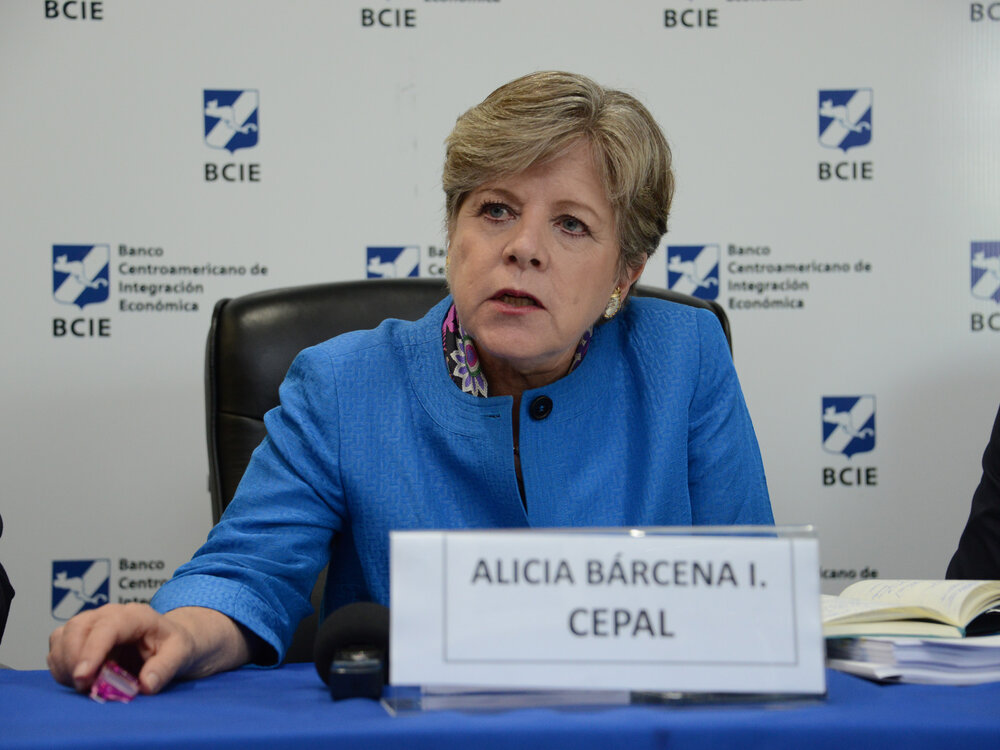CABEI promotes debate on ECLAC study of Latin American fiscal panorama

ECLAC Executive Secretary Dr. Alicia Bárcena presented the study called, “Fiscal Panorama of Latin America and the Caribbean 2015,” which targets weak personal income tax collection systems as the principal structural problem of Latin American tributa
San José, June 18, 2015.- In order to contribute to the country’s political and economic debate, the Central American Bank for Economic Integration (CABEI) invited Dr. Alicia Bárcena, Executive Secretary of the Economic Commission for Latin America and the Caribbean (ECLAC) to present the study, “Fiscal Panorama of Latin America and the Caribbean 2015: Policy Space and Dilemmas.”
The meeting took place at CABEI’s regional office in Costa Rica with organizational support from experts from the University of Costa Rica’s Center for Political Research and Studies (CIEP). Other participants included Costa Rican First Vice President and Finance Minister, Helio Fallas, Minister of Economy, Welmer Ramos, as well as vice-ministers, members of Congress, fiscal and economic decision makers and representatives of the business, academic and civil society sectors.
CABEI Director for Costa Rica Dr. Alberto Cortés Ramos said that the study’s presentation will provide a wealth of perspectives, information and input criteria for Costa Ricans who are analyzing and debating the country’s fiscal situation, in addition to possible strategies for dealing with it. “The study’s presentation can help us to see ourselves in a regional context compared with the rest of Latin America and the Caribbean; this will provide a medium and long term perspective, which will allow us to determine fiscal mechanisms that will be sustainable on the long run,” said Dr. Cortés Ramos.
Fiscal Panorama of Latin America and the Caribbean 2015
What are the characteristics of the fiscal environment in Latin America and the Caribbean? The ECLAC study indicates that public debt levels are relatively low in Latin America and high in the Caribbean. While Brazil has the highest public debt level in Latin America (62% of GDP), other South and Central American countries have moderate levels (including Costa Rica with 42%), and others like Chile and Paraguay have debt levels below 22% of GDP. On the other hand, public debt in the Caribbean totals an average of 80% of GDP (headed by Jamaica with 128%).
The study also notes that Latin America has the greatest income concentration of any region in the world. Therefore, it is important to evaluate the role of fiscal policy in order to propose tributary systems that are more redistributive and transparent: in countries with the greatest income disparity, fiscal policy must perform a more active redistributive role prior to dealing with other tax issues and public spending. One of the study’s most relevant findings regarding income tax equality is the preferential treatment of capital income, which produces an asymmetry with respect to the taxing of income from work.
The expert team that prepared the study makes a number of recommendations, including the need to strengthen the investment component in each of the region’s countries. This measure would lead to mobilizing short term internal demand and to promoting growth, thereby facilitating a successful path through the challenges of the economic cycle of growth and development on the medium and long term. In addition to this, the ECLAC study recommends promoting strategies to combat tax evasion and avoidance (especially in the case of personal income); applying similar rates to capital income and income from work; reducing preferential treatment; and lowering the income levels for applying the maximum tax rates, pursuant to the ranges established in other regions.
The simulations carried out in household surveys regarding potential reforms to the personal income tax demonstrate that there is sufficient room for expanding the redistributive power of the income tax. In the current national environment, which is characterized by a multi-sector debate about tax reform, the ECLAC study will provide valuable input for the discussion of tax policy.





